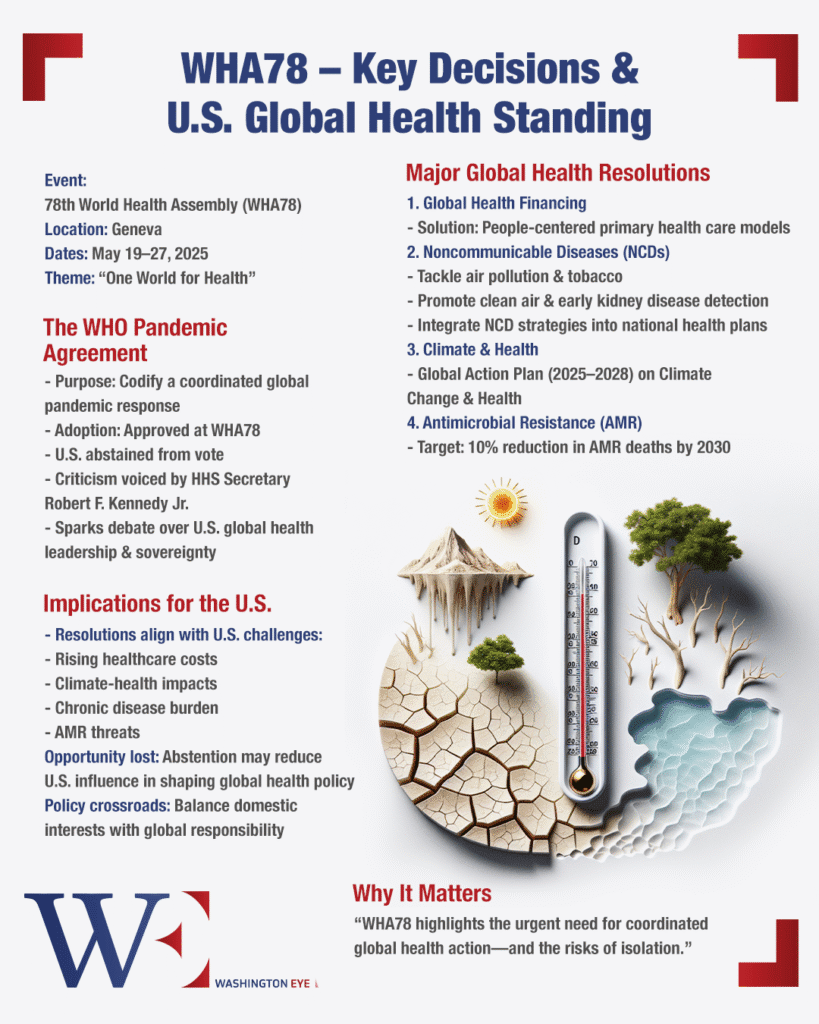The Seventy-eighth World Health Assembly (WHA78), held in Geneva from May 19 to 27, 2025, marked a decisive moment in global health diplomacy. Under the theme “One World for Health”, delegates from across the globe adopted major resolutions addressing climate change, antimicrobial resistance, noncommunicable diseases, and health financing—all with long-term implications for national health systems. But perhaps most consequential was the adoption of the first-ever WHO Pandemic Agreement, designed to codify a coordinated global response to future pandemics. Notably, the United States abstained from this landmark vote, raising questions about its evolving role in global health governance. As WHA78 sets the trajectory for international collaboration on urgent health issues, this article examines the assembly’s key outcomes and what they mean for U.S. public health, policy priorities, and global standing.
Strengthening Global Health Financing
Recognizing the escalating global health financing crisis, WHA78 approved a resolution emphasizing the need to bolster health financing mechanisms. This move comes in response to a projected 40% reduction in external aid for health in 2025, coupled with rising out-of-pocket expenses and disruptions in health services worldwide. The resolution underscores the commitment to achieving universal health coverage through people-centered primary health care.
Addressing Noncommunicable Diseases
For the first time, the assembly adopted resolutions specifically targeting lung and kidney health. The lung health resolution aims to combat respiratory diseases by addressing major risk factors like air pollution and tobacco use, promoting clean air policies, and integrating strategies with broader noncommunicable disease efforts. Similarly, the kidney health resolution calls for integrating kidney care into national health strategies, emphasizing prevention, early detection, and treatment.
Advancing Climate and Health Initiatives
WHA78 adopted the Global Action Plan on Climate Change and Health for 2025–2028, marking a significant step in integrating health considerations into climate policies. The plan provides a strategic framework for developing climate-resilient, low-carbon health systems, enhancing surveillance, and protecting vulnerable populations. This initiative positions health systems as integral to climate solutions.
Combating Antimicrobial Resistance
The assembly agreed to update the Global Action Plan on Antimicrobial Resistance (AMR), aiming for a 10% reduction in global deaths associated with bacterial AMR by 2030. This decision reflects the urgent need to address the estimated 4.71 million deaths linked to bacterial AMR as of 2021. The updated plan will adopt a multisectoral One Health approach, balancing the health of people, animals, and ecosystems.
U.S. Position on the Pandemic Agreement
A notable development was the adoption of the first-ever WHO Pandemic Agreement, designed to enhance global collaboration and ensure a more equitable response to future pandemics. However, the United States chose not to participate in the vote, with Health and Human Services Secretary Robert F. Kennedy Jr. criticizing the proceedings. This abstention highlights ongoing debates within the U.S. regarding international health governance and sovereignty.
Implications for the United States
The outcomes of WHA78 have significant implications for the United States. The resolutions on health financing, noncommunicable diseases, climate change, and antimicrobial resistance align with ongoing health challenges within the U.S., such as rising healthcare costs, the burden of chronic diseases, and the impacts of climate change on health. Engagement with these global initiatives could provide frameworks and support for addressing these domestic issues.
However, the U.S.’s decision to abstain from the Pandemic Agreement vote may affect its influence in shaping future global health policies. Balancing national interests with global health responsibilities remains a critical consideration for U.S. policymakers.
A Final Note
The Seventy-eighth World Health Assembly’s resolutions and initiatives underscore the interconnectedness of global health challenges and the necessity for collaborative solutions. As health threats transcend borders, the decisions made at WHA78 will shape the global health landscape for years to come.

















